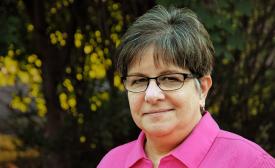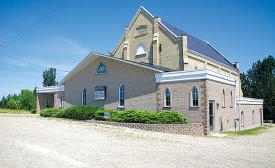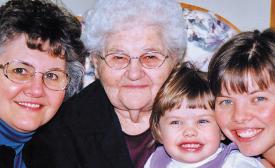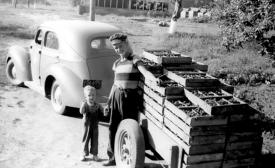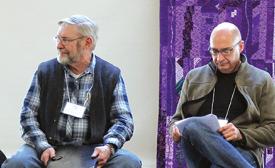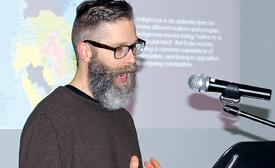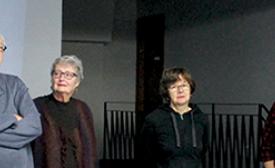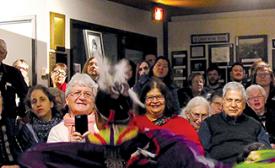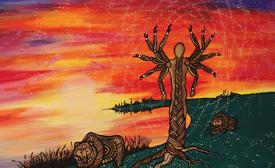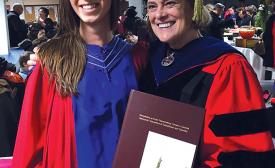Volume 22, Number 4
What kind of Mennonite?
In January 2017, a TV show drew attention to Mennonites in Canada. The CBC crime series Pure portrayed fictional Mennonite communities in Ontario and Mexico that were running a large illegal drug operation. A Mexican Mennonite drug lord controlled the operation through intimidation and violence.
Dying well

Within Mennonite denominations, the closure of churches is also a reality that requires acknowledgement and careful planning, so that their legacy might be a blessing. (Photo: © istock.com/hal990)

In Alberta, Faith Mennonite Church and Vauxhall Mennonite Church closed their doors in 1996 and 2000, respectively. Both congregations gave some funds to Camp Valaqua, a ministry of Mennonite Church Alberta. The contributions enabled the construction of the Faith Retreat Centre, above, and the Vauxhall Cabin, increasing the usability and accessibility of the camp for all. (Camp Valaqua photo)
Every living thing eventually dies, including churches. Just as people who do not plan for death may complicate things for their families, churches that do not plan for eventual closure can leave a mess for congregants and their surrounding communities.
Readers write: February 12, 2018 issue
Anabaptist Essentials ‘a quintessential travesty’
The following letter was abridged from one originally sent to Herald Press, the publisher of Palmer Becker’s Anabaptist Essentials.
Receiving is important
The tale “The Christmas Guest,” as told by Johnny Cash on his album Christmas with Johnny Cash, is a fable about an old man, Conrad, who receives a message from an angel that the Lord will appear to him on Christmas Eve. Conrad readies his place, expectant for Jesus to knock at his door. But throughout the night, Jesus doesn’t appear as expected.
‘Those who are in Christ will live forevermore’
I love doing funerals. As a young pastor, I now have nine under my belt. It seems I enjoy them more with each one. To be honest, I haven’t had any difficult funerals to do yet. No tragic circumstances or painful dynamics to deal with. Each one being a dear old saint, ready to be united with Christ in the heavens.
On meeting St. Francis

Learning to let go
Hauling strawberries
In February 1928, the first trainload of Mennonite farmers from the Prairies arrived in Yarrow, British Columbia, with prospects of farming the newly accessible land in the Fraser Valley. The introduction of raspberry and strawberry farming in the early 1930s increased the viability of these farms. The photo shows Len Doerksen (b. 1936) with his little brother Dan (b.
The in-between years
Emerging adult: it’s a relatively new category to describe the life stage between adolescence and the adult they will become.
The skill and soul of listening
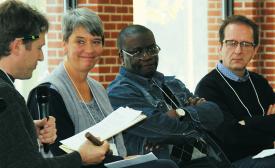
Matthew Bailey-Dick, left, the Anabaptist Learning Workshop coordinator, gives instructions to panel members Tanya Dyck Steinmann, Roberson Mbayamvula and Jim Loepp Thiessen. (Photo by Dave Rogalsky)
Listening to God in worship, contemplatively in a labyrinth, or in the Bible. Listening to each other across cultures, when your hearing is impaired or when with the elderly.
Mennonite Church Eastern Canada pastors, chaplains and congregational leaders gathered for a daylong seminar on listening on Jan. 20, 2018, at Redeemer College.
Seeking reconciliation through jubilee
What does the ancient Levitical concept of jubilee have to do with reconciliation between Indigenous peoples and their settler neighbours? Plenty, according to Steve Heinrichs.
Seeking reconciliation through multicultural art
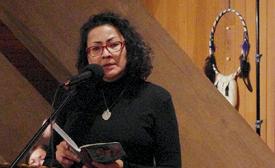
Rosanna Deerchild, host of CBC Radio One's Unreserved, reads a poem from her book Calling Down the Sky. The book tells the story of residential schools in Canada and her own mother's experiences and struggles as a generational survivor. (Photo by Nicolien Klassen-Wiebe)
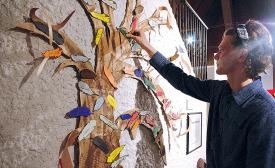
Bryn Friesen Epp of Home Street Mennonite Church in Winnipeg, adds a leaf to a collaboratively decorated tree. Each leaf contains a gallery visitor's hope for reconciliation and commitments to taking part in it. (Photo by Nicolien Klassen-Wiebe)
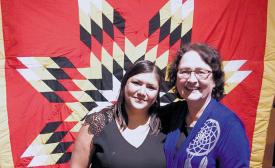
Clairissa Kelly and Marlene Gallagher organized the Reconciliation Through the Arts exhibition. (Photo by Nicolien Klassen-Wiebe)

Clairissa Kelly, right, her mother Marie, and her Grandmother Lorraine, seated, are pictured in front of 'Granny Lorraine.' Kelly, coordinator of the Peguis Post-Secondary Transition Program at Canadian Mennonite University (CMU), and Rick Unger, a CMU maintenance technician, used acid on metal and etching techniques to create the rusted portrait. (Photo by Nicolien Klassen-Wiebe)
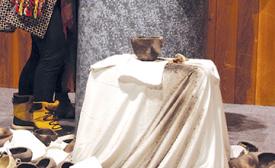
Jochebed Giesbrecht, Laura Carr-Pries and Allegra Friesen Epp stand around Tracy Fehr's installation of clay bowls. Fehr encourages visitors to take a bowl in honour of an important woman in their life and leave a note about the woman in its place. (Photo by Nicolien Klassen-Wiebe)
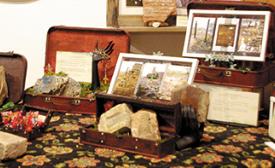
A collection of photographs and pieces of abandoned Canadian residential schools. (Photo by Nicolien Klassen-Wiebe)
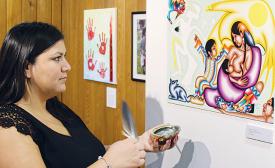
Clairissa Kelly smudges the Mennonite Heritage Centre Gallery in preparation for the exhibition's opening event. (Photo by Ray Dirks)
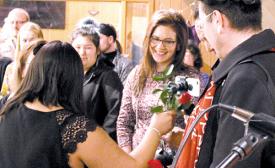
Clairissa Kelly gives roses to the many different artists involved in the Reconciliation through the Arts exhibition. Over 15 artists were involved in creating the many diverse pieces on display. (Photo by Ray Dirks)
Around 200 people gathered at the Mennonite Heritage Centre Gallery on Jan. 26 to celebrate the opening of Reconciliation Through the Arts, an exhibition of Indigenous and settler art that explores the history and present reality of colonization in Canada and different visions of reconciliation.
Women’s groups changed focus since 1970s
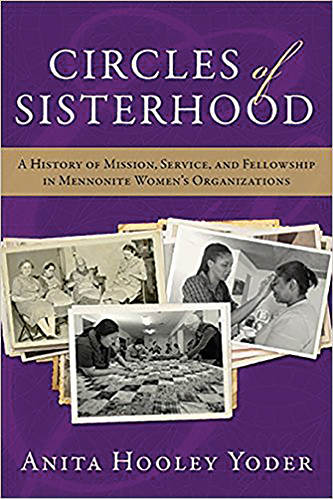 The golden age of Mennonite women’s organizations in Canada and the United States came in the years between 1940 and 1970, writes Anita Hooley Yoder in Circles of Sisterhood.
The golden age of Mennonite women’s organizations in Canada and the United States came in the years between 1940 and 1970, writes Anita Hooley Yoder in Circles of Sisterhood.
Filmmaker dedicated to telling the Mennonite story
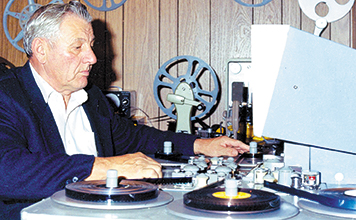
films that document the lives of Mennonites. (Photo courtesy of Ken Reddig)
An openness to learning is the first step

An ally holds a sign at the Winnipeg Women’s March in January 2018. ‘We need to acknowledge the fact that we are not presently equal,’ Kim Penner says. (Photo by Matthew Sawatzky)

Kim Penner holds a PhD in theology from the University of St. Michael’s College in Toronto. (Photo courtesy of Kim Penner)
Kim Penner graduated last November with a PhD in theology from the University of St. Michael’s College in Toronto. Canadian Mennonite called Penner at her home in Waterloo, Ont., to ask her about her dissertation, “Discipleship as erotic peacemaking: Toward a feminist Mennonite theo-ethics of embodiment and sexuality,” and what her work has to offer the Mennonite church.
Unfiltered Falk

The Generational Gaps DVD features 70 minutes of material Matt Falk developed after the release of his first album, Apple Pie & Scars. (Photo courtesy of Matt Falk)

Comedian Matt Falk’s first-ever DVD, Generational Gaps, is in stores on Feb. (Photo courtesy of Matt Falk)
For most comedians, delivering unfiltered material means cursing a blue streak. For Matt Falk, it means something else entirely.

